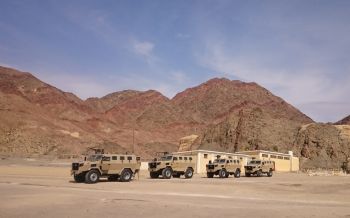Militants attacked pipeline infrastructure in the northern Sinai near Al-Arish in Egypt yesterday but failed to do significant damage or impact the flow of gas from Israel through the newly reopened East Mediterranean Gas (EMG) pipeline. Still, the incident serves as a sharp reminder of the risks that Islamic insurgents pose to energy infrastructure in the region.
An attack by armed gunmen, assumed to be militants aligned with Islamic State (ISIS), on a gas pipeline in the Bir al-Abd region caused an explosion and fire, but there were no causalities, according to media reports.
A source in the region confirmed to Gas Matters Today the attack was on a small Egyptian pipeline that carried gas to industries in the area, and the main EMG infrastructure was not affected. Repairs are underway.
The EMG pipeline resumed operation little more than two weeks ago with the start of shipments of Israeli gas from the offshore Leviathan field to Egypt’s Dolphinus Holdings.
Delek Drilling today acknowledged that an act of “sabotage” had been carried out on the EMG pipeline and in the gas transportation systems from the Leviathan project, but added that “natural gas is continuing to flow … from the Leviathan Project to Egypt”.
Sunday’s attack clearly demonstrates that security will continue to be a concern in the northern Sinai, where Egypt has been waging a war against Islamic militants since the 2011 revolution.
The source said both Egypt and Israel consider the gas deal between them and the infrastructure involved as a top priority. Large investments by both sides were made to ensure the proper operation of the pipeline on both ends, including reversing the flow of gas to accommodate the Leviathan-Dolphinus agreement.
US secretary of energy Dan Brouilette warned as recently as September that ongoing security concerns in the Sinai Peninsula in the vicinity of Al’Arish could undermine the timely delivery of Israeli natural gas to Egypt through the EMG.
Yesterday’s incident underscores the risk that Sinai insecurity still presents to embryonic plans being examined by Egypt and Israel for a joint LNG export facility on the Red Sea coast that would provide both countries with direct access to prime Asian markets.
Regional insecurity more generally is also a possible factor driving Delek’s pursuit of a floating liquefaction (FLNG) vessel at the Leviathan field, which would avert the need for onshore pipelines to deliver gas to end-consumers in Europe or further afield.
Prior to the reopening of the EMG in mid-January, the pipeline had been used to transport Egyptian gas to Israel in accordance with an agreement in 2005 that led to shipments to Israel beginning in 2008. But the EMG was closed in 2013 after numerous attacks on pipeline infrastructure connected to both the EMG and the Arab Gas Pipeline (AGP) to Jordan.
Egypt had also reached a point where it no longer had gas available for export due to rising domestic demand and was forced to stop exports. In the meantime, the development of large gas discoveries in the Israel offshore made Tel Aviv gas-independent, and now a gas exporter.
For Egypt, a recent surge in gas production allowed it to resume gas exports to Jordan last year and to also restart LNG processing and exports from its facility at Idku.
Delek Drilling, and its US partner in Leviathan, operator Noble Energy, along with Egypt’s Sphinx EG BV formed special purpose company EMED to purchase a 39% share of EMG for USD 518 million, securing them the right to transport gas from Israel’s Leviathan and Tamar fields to Egypt.
The EMG runs offshore between Ashdod and Al-Arish with landing terminals in both locations. The contract with Dolphinus, which has a total estimated value of USD 19.5 billion, calls for 85 Bcm of gas to be delivered to Dolphinus over 15 years. Throughput in EMG could average 7 Bcm annually and possibly reach 9 Bcm. - GL
Subscription Benefits
Our three titles – LNG Business Review, Gas Matters and Gas Matters Today – tackle the biggest questions on global developments and major industry trends through a mixture of news, profiles and analysis.
LNG Business Review
LNG Business Review seeks to discover new truths about today’s LNG industry. It strives to widen market players’ scope of reference by actively engaging with events, offering new perspectives while challenging existing ones, and never shying away from being a platform for debate.
Gas Matters
Gas Matters digs deep into the stories of today, keeping the challenges of tomorrow in its sights. Weekly features and interviews, informed by unrivalled in-house expertise, offer a fresh perspective on events as well as thoughtful, intelligent analysis that dares to challenge the status quo.
Gas Matters Today
Gas Matters Today cuts through the bluster of online news and views to offer trustworthy, informed perspectives on major events shaping the gas and LNG industries. This daily news service provides unparalleled insight by drawing on the collective knowledge of in-house reporters, specialist contributors and extensive archive to go beyond the headlines, making it essential reading for gas industry professionals.





